How Much Does Concrete Cost Per Square Foot?
Concrete is a versatile and durable material used in various construction projects, from driveways and sidewalks to patios and floors. Understanding the cost of concrete per square foot is essential for budgeting and planning any construction project. In this blog, we will explore the average costs, factors influencing these costs, and additional expenses to consider when calculating the total cost of a concrete project. By having a comprehensive understanding of these factors, you can make informed decisions and ensure the success of your concrete project.
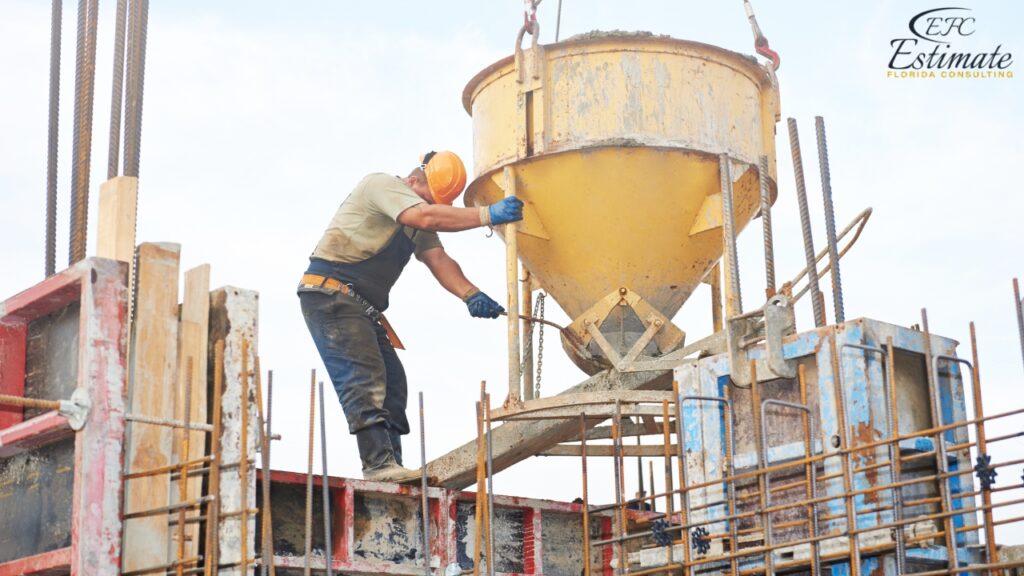
Average Cost Breakdown
The cost of concrete per square foot can vary significantly depending on the type of concrete and the specifics of the project. On average, here’s what you can expect:
Type of Concrete | Cost per Square Foot |
Basic Concrete | $5.60 – $8.40 |
Stamped or Decorative Concrete | $11.20 – $16.80 |
High-End Custom Concrete | $16.80 – $21.00 |
Basic Concrete: $5.60 - $8.40 per Square Foot
Basic concrete is typically used for simple slabs, driveways, and sidewalks. This cost includes minimal finishing and is ideal for projects where aesthetics are not a primary concern. It’s a cost-effective choice for functional areas requiring durability without decorative elements. For example, homeowners looking to install a plain driveway or walkway might opt for basic concrete due to its affordability and strength. Moreover, basic concrete is relatively easy to install, reducing labor costs and making it a popular choice for DIY projects. Its simplicity does not compromise its durability, making it a reliable option for various applications.
Stamped or Decorative Concrete: $11.20 - $16.80 per Square Foot
Stamped or decorative concrete involves adding patterns, textures, and colors to the concrete. This type is often used for patios, walkways, and decorative flooring, offering an attractive finish at a higher cost. The additional cost is justified by the enhanced visual appeal and the ability to mimic the appearance of more expensive materials like stone, brick, or slate. This option is perfect for those who want to enhance the curb appeal and aesthetic value of their property without breaking the bank. Additionally, stamped concrete can be customized to match any design theme, adding a unique touch to outdoor spaces. Its durability and low maintenance make it a long-term investment, providing beauty and functionality for years.
High-End Custom Concrete: $16.80 - $21.00 per Square Foot
High-end custom concrete includes intricate designs, multiple colors, and special finishes. This type is used for high-end residential or commercial projects where aesthetics are critical. The higher cost reflects the labor-intensive process and the use of premium materials. This type of concrete is ideal for luxury homes, commercial spaces, and areas where a unique, customized look is desired. Investing in high-end custom concrete can significantly increase the value and appeal of a property. Furthermore, high-end custom concrete allows for innovative design possibilities, enabling property owners to create one-of-a-kind features.
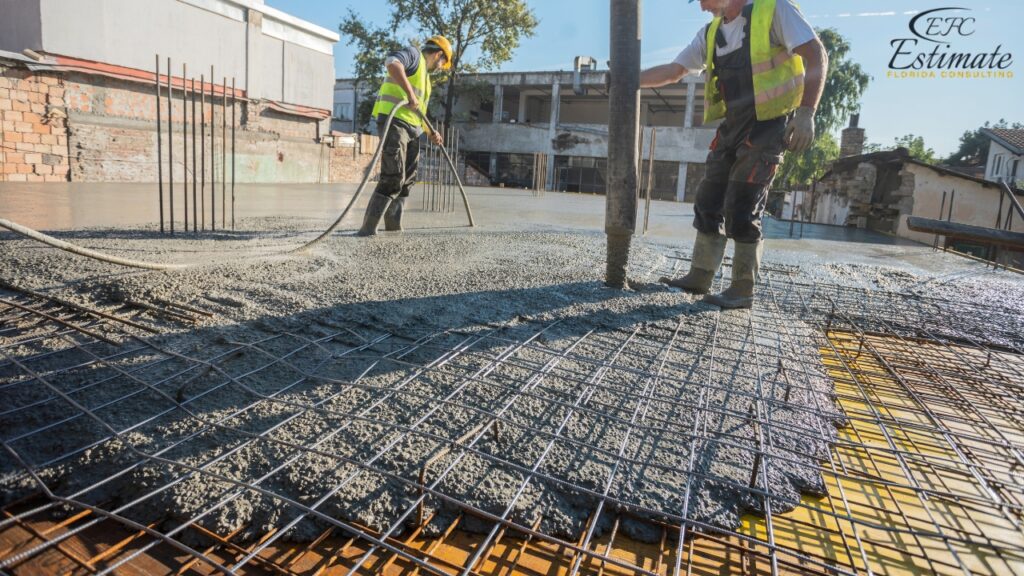
The investment in high-quality materials and skilled craftsmanship ensures that the finished product will stand out and withstand the test of time.
Factors Affecting the Cost of Concrete
Several factors can influence the cost of concrete per square foot, including:
Type of Concrete
Different types of concrete, such as regular, reinforced, and lightweight, have varying costs. Reinforced concrete, for example, includes steel rebar or wire mesh for added strength, increasing the price. Lightweight concrete, while easier to handle and suitable for certain applications, may cost more due to the specialized materials used. The choice of concrete type depends on the specific requirements of the project, including load-bearing needs and environmental conditions. Regular concrete is often sufficient for residential projects, while reinforced concrete is necessary for heavy-duty commercial applications. Understanding the properties of each type helps in selecting the most appropriate and cost-effective option.
Thickness of the Slab
Thicker slabs require more material, which increases the cost. For example, a 6-inch thick slab will cost more than a 4-inch thick slab due to the additional concrete needed. The thickness of the slab is often determined by the intended use of the area, with heavier loads requiring thicker, more durable slabs. Properly assessing the necessary thickness can prevent future issues such as cracking or sinking. Additionally, thicker slabs provide better insulation and stability, making them suitable for areas with heavy traffic or machinery. Investing in the right thickness ensures the longevity and safety of the concrete structure.
Site Preparation
Costs can increase if the site requires significant preparation, such as excavation, grading, or demolition of existing structures. These preparations ensure a stable foundation but add to the overall expense. Proper site preparation is crucial for the longevity and performance of the concrete, as it addresses potential issues like drainage, soil stability, and underlying structures. Investing in thorough site preparation can prevent costly repairs and maintenance in the future. Additionally, well-prepared sites facilitate smoother and faster concrete installation, reducing labor costs and project timelines. Ensuring proper site preparation is a critical step in achieving a successful concrete project.
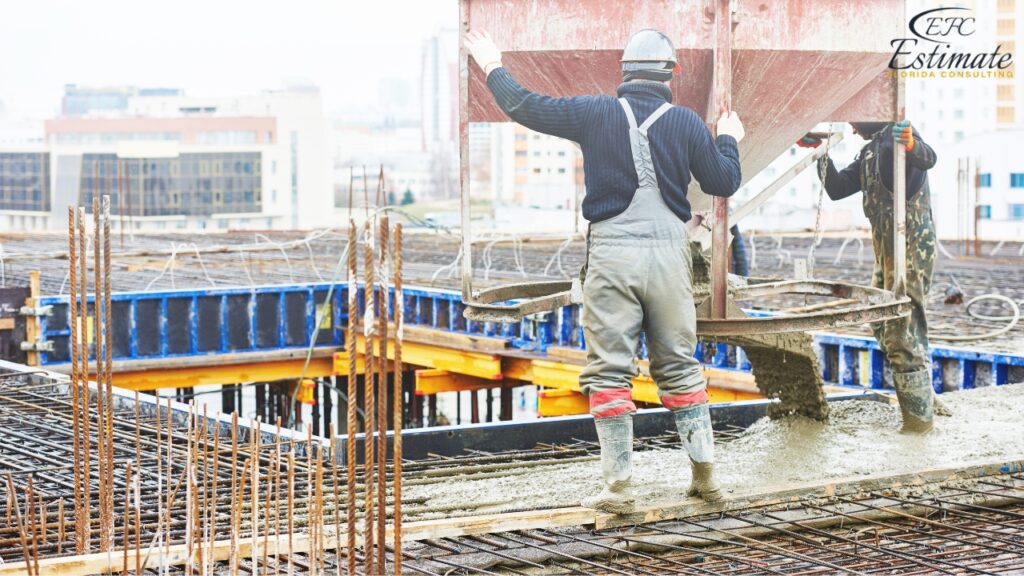
Reinforcement
Adding rebar or wire mesh to reinforce the concrete adds to the cost. Reinforcement is often necessary for driveways, garages, and other heavy-load areas to prevent cracking and increase durability. The choice of reinforcement material and its installation can impact both the initial cost and the long-term performance of the concrete. Proper reinforcement ensures that the concrete can withstand the pressures and stresses it will face over time. Furthermore, using high-quality reinforcement materials enhances the structural integrity and longevity of the concrete, providing better value for the investment. Reinforcement is essential for projects that demand high strength and durability, ensuring safety and reliability.
Location
Prices can vary based on regional material and labor costs. Urban areas with higher labor rates and material costs will typically see higher prices than rural areas. Additionally, local regulations and building codes can influence the cost of materials and the methods used in construction. Understanding the local market and regulatory environment can help in accurately budgeting for the project. For example, coastal areas may require specific types of concrete to withstand salty air and moisture, increasing costs. Being aware of these regional factors allows for better planning and cost management, ensuring compliance and quality.
90% More Chances to Win Projects With Our Estimate!
- Multi-Family Building
- Hotel Building
- Hospital Building
- Warehouse Building
- School & University Building
- High-Rise Building
- Shopping Complex
- Data Center Building
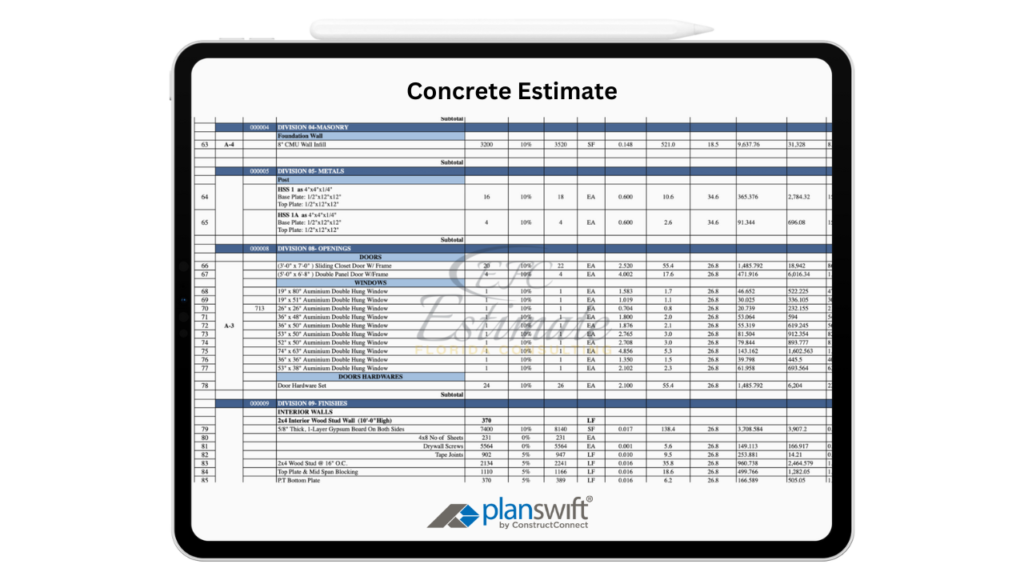
Finishing and Curing
The method of finishing (troweling, stamping, etc.) and curing the concrete also affects the price. More complex finishes and longer curing times can increase labor costs. Proper finishing and curing are essential for achieving the desired appearance and performance of the concrete. Investing in quality finishing and curing processes can enhance the durability and aesthetic appeal of the final product. Finishing techniques like polishing or sealing can provide additional protection and longevity, while proper curing prevents premature cracking and ensures the concrete reaches its full strength. These processes are vital for maintaining the integrity and appearance of the concrete over time.
Additional Costs to Consider
In addition to the basic cost of concrete, several other expenses can influence the total cost of your project:
Labor Costs
Labor costs vary widely based on the complexity of the project and local labor rates. On average, labor can add $2.80 to $4.20 per square foot to the total cost. Skilled labor is essential for ensuring that the concrete is mixed, poured, and finished correctly. Investing in experienced professionals can prevent costly mistakes and ensure a high-quality result. Additionally, skilled laborers can complete the project more efficiently, reducing overall labor hours and costs. Ensuring proper training and certification for workers also enhances safety and quality, minimizing risks and improving outcomes.
Permit Fees
Depending on your location, you may need to obtain permits for your concrete project. Permit fees can range from $70 to $700 or more, depending on the scope of the project. These fees are necessary to ensure that the project complies with local building codes and regulations. Obtaining the proper permits can prevent legal issues and delays during the construction process. Consulting with local authorities early in the planning stage can help identify necessary permits and streamline the approval process. Properly navigating the permitting process ensures compliance and smooth project progression.
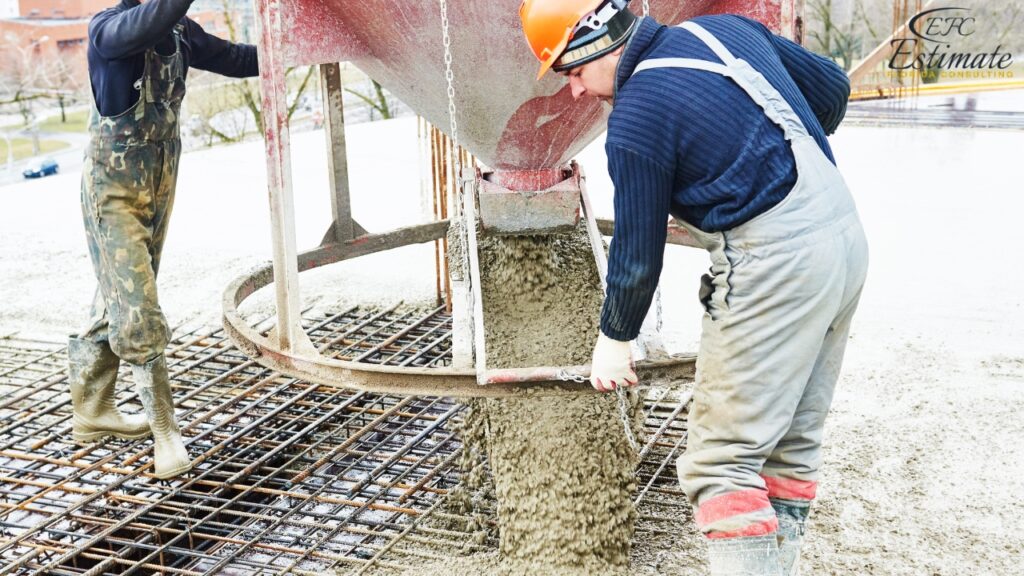
Gravel Base
A gravel base is often necessary to ensure proper drainage and a stable foundation for the concrete. The cost of a gravel base can range from $1.40 to $2.80 per square foot. Properly installing a gravel base can prevent issues such as water pooling and shifting soil, which can compromise the integrity of the concrete. This preparatory step is crucial for the longevity and performance of the concrete structure. Investing in a quality gravel base ensures that the concrete remains stable and durable over time. Additionally, a well-laid gravel base facilitates better compaction and leveling, enhancing the overall quality of the concrete.
Expansion Joints
Expansion joints are used to allow the concrete to expand and contract without cracking. These joints add an additional $1.40 to $2.80 per linear foot. Properly placed expansion joints can prevent cracking and extend the lifespan of the concrete. They are particularly important in areas with significant temperature fluctuations or heavy traffic. Ensuring the correct placement and type of expansion joints is essential for maintaining the integrity and appearance of the concrete over time. Investing in high-quality materials and proper installation techniques for expansion joints ensures long-term performance and durability.
Sealing
Sealing the concrete can protect it from stains, weather, and wear. Sealing costs typically range from $0.70 to $1.40 per square foot. Sealing adds a protective layer that enhances the durability and appearance of the concrete. Regular sealing can maintain the concrete’s appearance and prevent damage from moisture, chemicals, and abrasion. It also makes the concrete easier to clean and maintain, reducing long-term upkeep costs. Investing in regular sealing treatments ensures the longevity and aesthetic appeal of the concrete, providing better value over time. Sealing is a crucial step in preserving the integrity and appearance of the concrete, especially in high-traffic or exposed areas.
Example Cost Calculation
Let’s consider a couple of examples to illustrate how these costs add up.
Example 1: Basic Concrete Driveway
- Area: 1,000 square feet
- Cost of Basic Concrete: $7 per square foot
- Total Concrete Cost: 1,000 sq ft * $7 = $7,000
- Labor Costs: 1,000 sq ft * $3.50 = $3,500
- Gravel Base: 1,000 sq ft * $2.10 = $2,100
- Permit Fees: $280
- Expansion Joints: 200 linear feet * $2.10 = $420
- Total Cost: $7,000 + $3,500 + $2,100 + $280 + $420 = $13,300
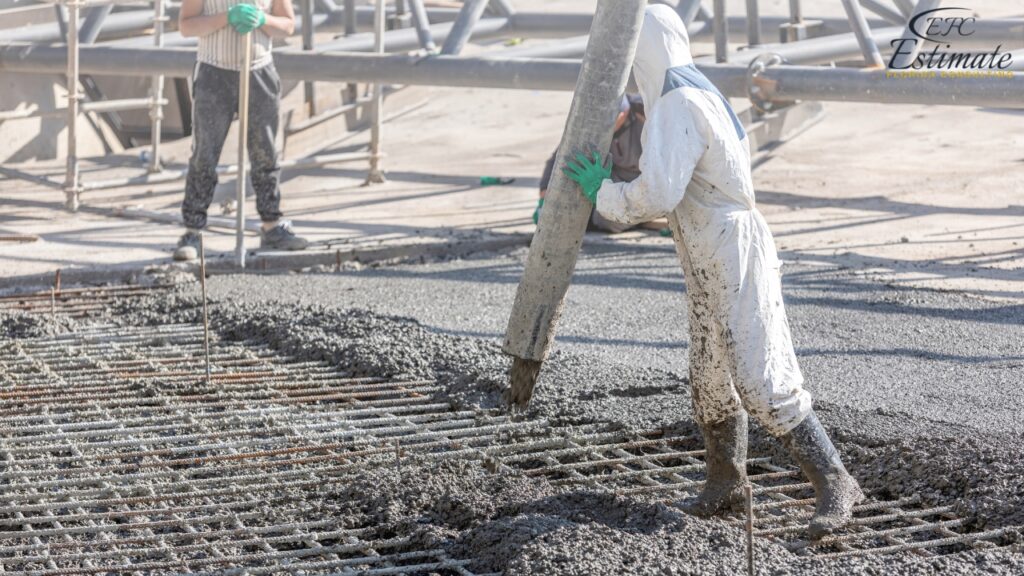
Example 2: Stamped Concrete Patio
- Area: 500 square feet
- Cost of Stamped Concrete: $14 per square foot
- Total Concrete Cost: 500 sq ft * $14 = $7,000
- Labor Costs: 500 sq ft * $4.20 = $2,100
- Gravel Base: 500 sq ft * $2.80 = $1,400
- Permit Fees: $210
- Sealing: 500 sq ft * $1.05 = $525
- Total Cost: $7,000 + $2,100 + $1,400 + $210 + $525 = $11,235
Download Template For Concrete Project Breakdown
- Materials list updated to the zip code
- Fast delivery
- Data base of general contractors and sub-contractors
- Local estimators

Conclusion
Understanding the cost of concrete per square foot is essential for planning and budgeting your construction project. By considering the type of concrete, thickness, site preparation, reinforcement, location, and finishing, you can get a more accurate estimate of the total cost. Additionally, factoring in labor costs, permit fees, gravel base, expansion joints, and sealing will help you avoid unexpected expenses. Always get multiple quotes from contractors to ensure you are getting a fair price and the best quality work. With careful planning and budgeting, you can achieve a successful concrete project that meets your needs and expectations.
FAQs
The cost of concrete per square foot varies based on the type of concrete. On average:
- Basic Concrete: $5.60 – $8.40
- Stamped or Decorative Concrete: $11.20 – $16.80
- High-End Custom Concrete: $16.80 – $21.00
Several factors can affect the cost:
- Type of concrete (basic, stamped, high-end custom)
- Thickness of the slab
- Site preparation requirements
- Reinforcement needs
- Local labor and material costs
- Finishing and curing methods
Beyond the basic concrete cost, consider:
- Labor costs
- Permit fees
- Gravel base installation
- Expansion joints
- Sealing costs
Use a formula that includes:
- Total area in square feet
- Cost per square foot of chosen concrete type
- Labor costs
- Additional expenses like gravel base, permits, and sealing
- Compare quotes from multiple contractors.
- Opt for basic concrete if decorative elements are not crucial.
- Minimize site preparation needs by selecting a stable location.
- Plan for adequate curing and sealing to reduce future maintenance costs.
Google Reviews



Process To Get Concrete Cost Per Square Foot Estimate Report
Here I am going to share some steps to get concrete cost per square foot estimate report.
-
You need to send your plan to us.
You can send us your plan on info@estimatorflorida.com
-
You receive a quote for your project.
Before starting your project, we send you a quote for your service. That quote will have detailed information about your project. Here you will get information about the size, difficulty, complexity and bid date when determining pricing.
-
Get Estimate Report
Our team will takeoff and estimate your project. When we deliver you’ll receive a PDF and an Excel file of your estimate. We can also offer construction lead generation services for the jobs you’d like to pursue further.

